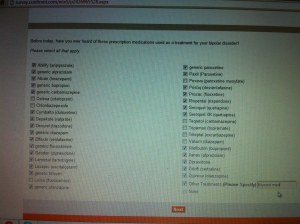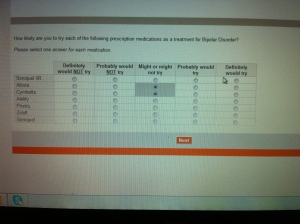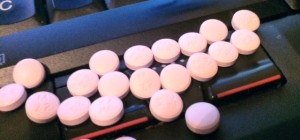
screen shot 1
Sometimes while I watch some mindlessly good television or when I listen to some Rich Eisen podcasts, I take online surveys via those sites that pay you for taking them. Some of the surveys are rather interesting, and occasionally it’s a way to get to know what products may be in the pipeline for various brands. The other day, I took a survey that wasn’t about shopping, alcohol or cars; it was about bipolar meds—which I’m happy to answer questions about since I’m familiar with many of them. So, I began the survey only to realize several things, both about me as a psych patient and about the industry that supplies these medications.
One, it reminded me very early on in the survey that I’ve taken a lot of them (see screen shot 1-sorry about the poor quality of photo). The truth is, while I did not check every single drug they listed on this page, I probably may have taken some of those but just don’t remember them as well. Also, I’m pretty sure I’ve taken other meds not listed on this page that don’t qualify as bipolar meds per se, but are still mood altering. It was a horrifying moment to see the glowing list in front of me and having to confront my history. But the fun of this survey had only just started.
A few pages after having to confess my medication history, an interesting question was posed to me (as seen on screen shot 2: this one can be magnified): how likely am I to try the following bipolar meds? They gave me a short list of the newer p-meds out on the market, and asked me to give my inclination toward them. There was no description of the chemistry of these medications, what class of psychiatric meds they’re in, or really anything else. Just the names. Like whether I’d try Quaker Oats brand cereal versus ones by Erewhorn. While I admit that I had already taken most of them on this list, too, it made me almost cringe in having to wonder what kind of patients those of us with mental illnesses have become.
The survey eventually led to showing of several different commercials and print advertisements, and then asked me stuff like my reaction to the commercial, etc. And then it asked how likely I am now to ask for that particular drug to my doctor. It was rather insulting that these companies think I’d be persuaded to ask for a drug because their ads looked pretty. But furthermore, what is the purpose of having a psychiatrist if we, the patients, just point and ask for these medications, like we’re picking out our favorite easter candy? Well, according to this survey, our doctors really have just been reduced, to put it bluntly, to that of a drug dealer.
From taking this lovely survey, two big conclusions were drawn. As many people already know, the drug company’s job, while it is to help people through chemistry, is to be a profitable company. And like any product, they will market them to the public as allowed by law. But perhaps what’s more important to learn for people taking medications is that the responsibility is largely on us,the customer, to be alert about medications being pitched to us like a new cleaning detergent. It’s hard to be discerning when we’re so desperate to get through another day or even a minute of agony that comes with mental illness. But we really have no choice but to pay attention to what we’re ‘asking for’ or being given samples of by our doctors. And we should expect our doctor, the person we paid for in order to get their professional advice, to steer us to make informed decisions when taking new meds.
I wish I had taken a few more screen shots of this survey since it was quite fascinating. But more than that, it made me worried about the direction that the treatment of mental illness is taking in regard to the approach that tries to make us try medications like we’re choosing our next favorite cereal.
























